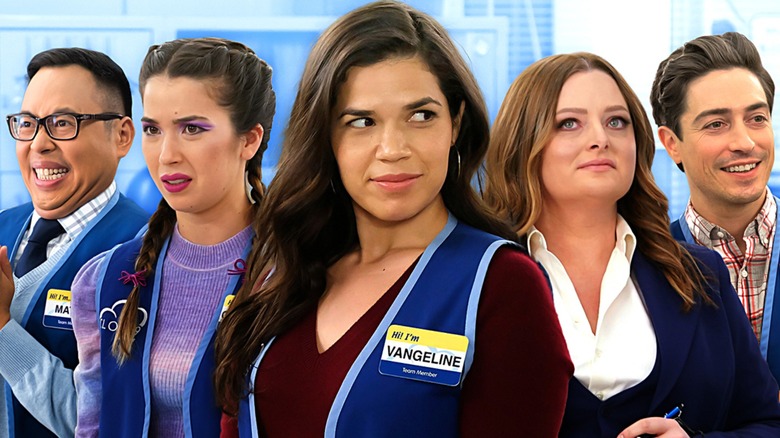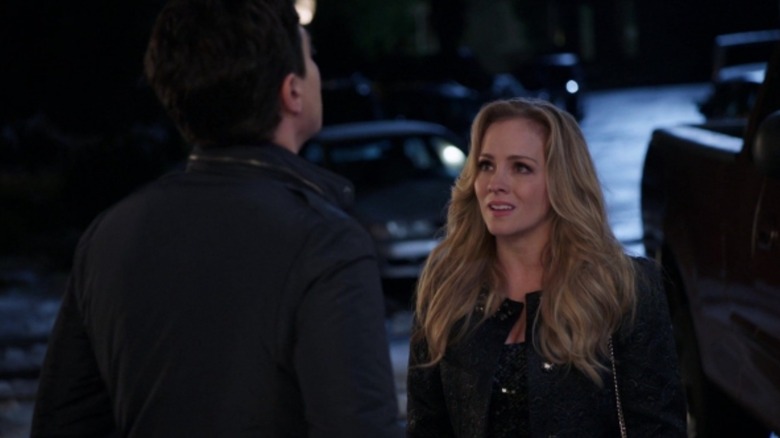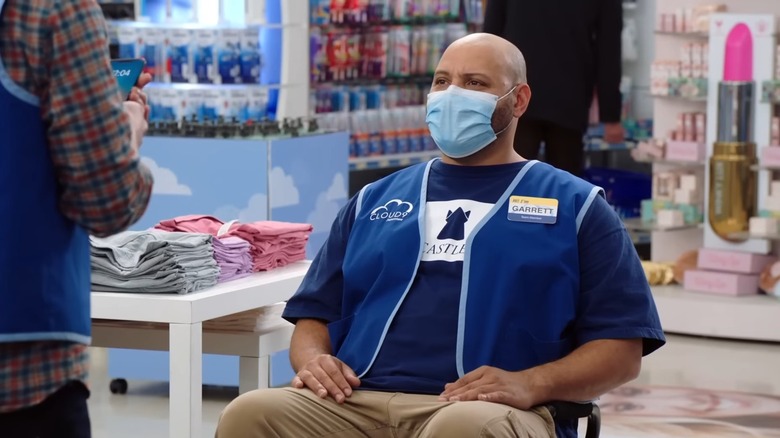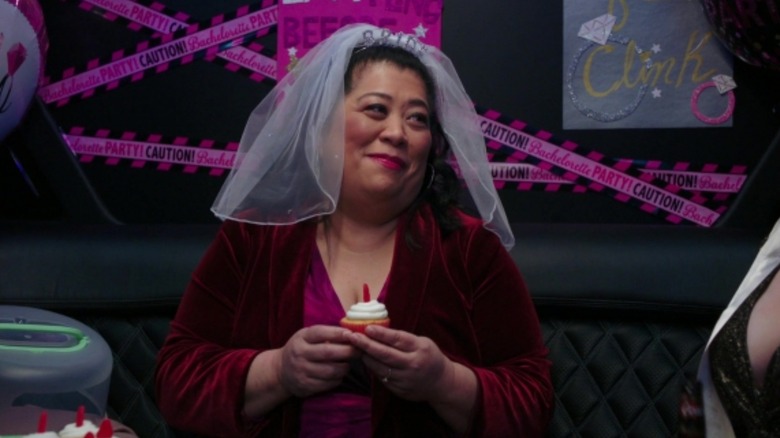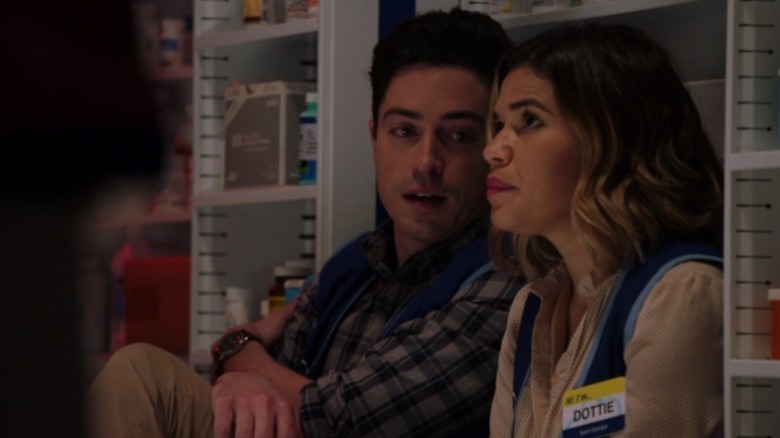Every Season Of Superstore, Ranked
When TV fans and industry analysts talk about the last great network sitcoms to break through in the streaming era, "Superstore" should be one of the first names on their lips. The wildly funny, unapologetically pro-worker sitcom aired on NBC from 2015 to 2021, capturing the strange derangement of Trump-era America through the prism of a Midwestern big box store (think Walmart) where the customers are bizarre, the staff is endearingly dysfunctional, and nameless corporate bigwigs will do anything for their bottom line.
"Superstore" has the loveable ensemble cast energy of shows like "Parks and Recreation" and "Brooklyn Nine-Nine," but where those shows have already been aged by their optimism, "Superstore" takes a realist approach to the stupid, dystopian daily struggles of late capitalism. It rattles off some of the funniest jokes I've ever heard at breakneck speed, all while simultaneously crafting touching, radicalizing plotlines about workers' rights, healthcare, immigration, and more.
It's also a hell of a love story. Anchored by strong performances from America Ferrera and Ben Feldman, "Superstore" tracks the relationship between career employee Amy and rich newbie Jonah from meet cute to "work flirt" and beyond. One season's missteps aside, the show crafts its romantic subplot with as much care and creativity as its comedic and dramatic storylines, building up one of the most rewarding sitcom relationships in recent memory.
Every season of "Superstore" has its merits, but if you need to skip straight to the best stuff on rewatch, we've got you covered: here's our ranking of the show's seasons, from so-so to incredible.
6. Season 3
For its first few seasons, "Superstore" was both an uproarious workplace comedy and a swooning romance. The Amy and Jonah relationship would return to the forefront in later seasons, but first it endured some undeniable low points — most of them in season 3. This batch of episodes introduces Kelly (Kelly Stables), a character who's never fully able to gain a spot in the main ensemble thanks to her awkward position as Jonah's new girlfriend and Amy's colleague.
Stables is as funny as the rest of the cast, but it's painful to watch her character used as a lazy narrative crutch for a relationship that the show's writers clearly wanted to put off a bit longer. Even if you don't care about Jonah and Amy, the Jonah and Kelly plot is a cringey, cliche-filled time suck for a show that usually makes every moment count. Season 3 is a tougher watch than the rest in general, as the bad timing on Amy and Jonah's part leaves newly divorced Amy feeling adrift and unhappy — and by season's end, pregnant.
While Amy and Jonah disappoint in season 3, the show still delivers screamingly funny plot points and biting social commentary. One of the single funniest one-off plots in the series involves the Cloud 9 staff's attempts to mourn their coworker Brett (Jon Miyahara), who may or may not have died in season 2's tornado. Other episodes are more serious, addressing topics like the dearth of benefits for low-wage workers and the lack of job protections for older employees.
5. Season 1
Despite its low spot on this list, "Superstore" season 1 is actually pretty great. The show hits the ground running, introducing a quirky and sometimes surreal big box store ecosystem full of truly delightful characters. The show's joke writing is sharp right off the bat, and the first season's only drawback is that it's still getting its bearings and is in the process of finding its heart. Early on, each character shines individually (Mark McKinney's manager Glenn is hilarious from the show's first episode to its last), but they don't quite gel together as a cohesive — if dysfunctional — found family unit yet.
Season 1 has plenty of upsides, though, including endearing teenager Cheyenne's (Nichole Sakura, who gets some of the best punchlines of the show) pregnancy plotline. When Cheyenne finally gives birth in the season 1 finale, her lack of maternity leave triggers what will become the show's most enduring and powerful overarching plot: a face-off between the working poor members of Cloud 9 and the union-busting corporation that holds all the power in their lives. "Superstore" season 1 hints at its class-conscious ideals here, but doesn't fully dig into them until later seasons.
4. Season 4
In season 4, "Superstore" throws a major wrinkle into its labor movement subplot by giving Amy, once a voice of the people, a managerial role. In a lesser series, the show would have stayed firmly on Amy's side, making concessions for her worker bee mentality, but "Superstore" keeps things admirably complicated. By season's end, Amy and pro-union Jonah end up on opposite sides of what looks to be a major fight, even though they're now dating. "Superstore" addresses tricky topics like worker solidarity and reform from within without missing a beat, criticizing both Amy's internalized attitudes about work and — in one great episode — Jonah's showy liberalism.
The season also features lots of stand-out episodes, including "Delivery Day," an episode about the births of Amy and Dina's babies that takes a no-holds-barred look at the broken healthcare system in America. Season 4 isn't all politics, though: there's also a fun, blizzard-set episode that sees the Cloud 9 crew trapped in the store overnight, an intense Garrett-Dina feud, and some unforgettable jokes about Glenn's eccentric evangelist tendencies. The season gets serious again during the home stretch, as Mateo's immigration status comes to light and the Cloud 9 team must rally around him to prevent his deportation. Season 4 of "Superstore" is more low-key than others, but it's still a standout thanks to its impressive ability to mix laugh-out-loud comedy with progressive issues that impact blue-collar workers everywhere.
3. Season 6
In terms of shows that addressed the COVID-19 pandemic directly, it doesn't get much better than "Superstore." The series is realistic about the uneasy truths of pandemic life for front-line workers, from inconsistent masking (it's jarring but authentic to see some of our faves drop their masks during their breaks) to hoarding supplies to the inevitable corporate push to increase shoppers. The show diverges from reality in its back half, pretending covid has mostly passed for the sake of a return to near-normalcy, and although it's disorienting, that's probably a smart move too.
The sixth season's equilibrium is also disturbed by the absence of Amy, who leaves early on for a corporate job in California. "Superstore" does a great job filling the void left by Ferrera with zany plots, but she also returns soon enough to wrap up the show. It's the end of "Superstore" that earns this somewhat uneven season such a high spot on this list: the show's series finale, and the episodes that lead up to it, are near-perfect. They're a culmination of all the show's best qualities, from its ferocious anti-capitalist spirit to its penchant for dreamy romance to its understanding that at the end of the day, most of us are just people trying to make ends meet. "Superstore" signs off with an ending that's funny and deeply moving, solidifying it as one of the best sitcoms of the 21st century to date.
2. Season 5
In its fifth season, "Superstore" is as cutting and morally clear as it is funny. The show mines dystopian topics for humor with tremendous results, with bits about job-stealing robots and men's rights groups spliced seamlessly into typical workplace humor. It's a product of its time — 2019 and 2020 — in the best way, able to help audiences laugh at the bizarre and scary depths of America's fanaticism, if only for a moment. We're not surprised when dumb-as-rocks Marcus (Jon Barinholtz) starts feeling threatened by a girl power-friendly store display, or when Garrett (Colton Dunn, the show's secret weapon) spots a T-shirt that says "Love this land or I'll bury you in it" during a weird customer scavenger hunt.
The show addresses these upsetting realities with signature levity, but it also allows for some heavier moments — and pulls them off. One of the most gutting "Superstore" moments comes mid-season, when a hard-won union battle is suddenly made moot by a corporate buyout. Few American TV shows attempt to dig into the labor movement at all, but it's at the heart of "Superstore," and the show takes a heart-forward approach that gets viewers completely invested in Cloud 9's fight for fair treatment. The buyout twist is as heartbreaking as a character death would be in a different type of show, but this season deals directly with death, too, in an episode that lovingly memorializes Myrtle after the death of actress Linda Porter.
Season 5 also stands out as the season that finally gave key Cloud 9 staff members the attention they deserved. Fan favorites like Dina (Lauren Ash) and Sandra (Kaliko Kauahi) are given more complete storylines, with each underrated supporting actor rising to the occasion to meet the great material.
1. Season 2
"Superstore" hits its stride and then some in season 2. While the show was funny enough in its earliest days, its sophomore season elevates the comedy to near-hysterics levels. Moments like the cold open of "Spokesman Scandal," in which the staff beatboxes and sings bible songs to distract customers from a breaking news report about the store's serial killer mascot, are among the funniest sitcom scenes of the decade. Before it did the same with the COVID-19 pandemic, "Superstore" was already adjusting to unprecedented times, using the strange brew of 2016 to its benefit by crafting a world in which Cloud 9 customers reflect the absolute wackiness of the outside world to a T.
This season also gets into a groove with its characters: while they're individually funny in season 1, they begin to bounce off one another in an organic and satisfying way in season 2. If the first season mirrors the early days of a new job, when everyone seems at once interesting and somewhat distant, season 2 feels like a workplace that's fallen into sync, where everyone knows one another a bit too well and compatible coworkers bounce off each other's energy in a way that almost feels like magic.
The show's second season also heats up the Jonah-Amy romance with an electrifying "work flirt," bucking the trend of sitcoms that came before it with nimble, butterfly-inducing writing choices that allow the pair to all but confess their feelings outright throughout the season (very early in the show's run, by sitcom standards). The finale, "Tornado," sees the pair take the next step, sharing a passionate kiss when they fear they're about to die during a major whirlwind. "Tornado" is an incredible, ambitious episode, one that puts an ensemble of characters we've already grown to love in an extreme situation that lays bare their fears, desires, and love for one another. It's the first hint that "Superstore" can do drama as well as it does comedy, and it's the show at its absolute best.
